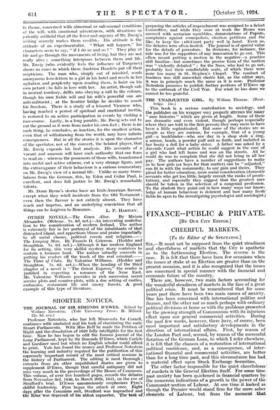SHORTER NOTICES.
Professor Notestein, who has left Minnesota for Cornell, continues with unabated zeal his task of elucidating the early Stuart Parliaments. With Miss Bell he made the Petition of Right and the dissolution of 1629 fully intelligible for the first time. Now he has begun to edit the famous journal of the Long Parliament, kept by Sir Simonds D'Ewes, which Carlyle and Gardiner used but which no English scholar could afford to print. Yale has found the money and Professor Notestein the learning and industry required for the publication of this supremely important record of the most critical sessions in the history of Parliament. The editing is most thorough ; extracts from six other unpublished diaries are given to supplement D'Ewes, though that careful antiquary did not miss very much in the proceedings of the House of Commons. This volume, of over five hundred pages, records 'the debates from November 3rd, 1640, to March 20th, 1641, on the eve of Strafford's trial. D'Ewes unconsciously emphasizes Pym's skilful leadership. Ppm began the attack at once. Eight days after the Commons met, Strafford was impeached and the Kint Was deprived of his ablest supporter. The task of
preparing the articles of impeachment was assigned to a Select Committee, and while they were at work the House was amused with -sectarian squabbles, denunciations of Papists, complaints against monopolists, election petitions and the like, to keep the nti-Court party well in hand. Even so, the debates were often heated. The journal is of special value for the details of pittedure. In 'divisions, for instance, the rule was for the supporters of any innovation: to go out. This often meant putting a motion in the negative—a practice still familiar—but sometimes the precise form of the motion was "violently debated " • for the Noes, who had to go out, probably lost their ,comfOrtable seats, of which there were none too many in St. Stephen's Chapel. The conduct of business was still somewhat elastic but, AS the editor says, it was in principle much the same as it is now. Professor Notestein promises to publish further portions of D'Ewes up to the outbreak of the Civil War. For what he has done we cannot be too grateful.


























































 Previous page
Previous page